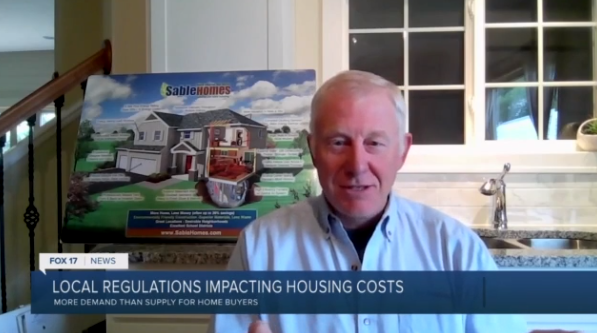
John Bitely featured on FOX 17 about how government regulatory fees are inflating home prices
The National Association of Home Builders recently announced almost a quarter cost of new homes is tied to regulatory fees at all government levels. Sable Homes President John Bitely spoke with FOX 17 about how local regulations have not only added more cost to the price of a home, but have also slowed the process for the consumer.
“When the consumer, the person buying the home is being forced to spend an extra $30,000-$40,000 in regulations and extra code things, and realistically, if you just ask them if they want it, this is one of the things that always gets tricky in the surveys,” Bitely said during his interview with FOX 17. “If I just asked you if you’d like that you would say ‘yeah, I’d like that.’ I would say. ‘Oh, but you have to pay for it’ and you’d say ‘oh, wait a minute.’”
Across the country, the cost of homes continues to rise, but so does the demand for both new and existing homes. About 23 percent of the cost of a new home is tied to regulatory fees, meaning on a $300,000 house around $71,000 goes to pay those fees.
“Our National Home Builders Association put out, showing that every new home has about 23-23.8 percent regulation into the cost,” said Bitely.
Bitely said local regulations include things like larger lot sizes, increased stormwater retention for developments and communities requiring specific curbing and sidewalks. Many new codes are also now becoming mandated. For example, for a new garage, it will soon be required to install an electric vehicle charger even if you won’t use it.
Bitely said that’s an extra $2,000-$5,000 that homeowners don’t really need to be spending.
“We need to, as consumers, figure out how to control these costs before we drive off the cliff because we’re going,” said Bitely. “We really are.”
Bitely said it’s important to make your voice heard in local elections when it comes to housing to ensure those living in the communities are getting what they want without paying a fortune.
The Michigan Townships Association released a statement regarding regulatory fees:
“The Michigan Townships Association does not track construction-related fees for planning and zoning or construction code enforcement charged by townships. However, in our ongoing discussions and interactions with township officials and staff around the state on a day-to-day basis, we are not aware that there has been a noticeable increase in any of those fees specifically, in West Michigan or any other part of the state.
Land use regulations, usually in the form of planning and zoning, have been a lawful option for local units to use to improve life and business locally for over 100 years. As one of the original purposes for zoning in America, protecting home and family is still a primary consideration of planning and zoning programs.
In Michigan, it is a choice of each individual local unit, as no township, city, village or county is required to plan or zone or enforce the state construction code. Many Michigan townships have chosen to adopt some or all of those options, based on their determination of the benefit to their residents and their economy. But none of those forms of regulation come without costs, including the legal requirements for due process to protect property owners’ rights, enforcement costs, administration and providing for a planning commission and zoning board of appeals, inspectors and other staff, all with ongoing training and legal representation.
The legal basis for imposing fees is the recognition in law that there will be programs or services that incur additional costs to the local unit—and the taxpayers—when individuals or businesses seek an approval or license or permit. It is a policy decision by the township board or city or village council or county commission that those individuals or businesses should pay some or all of those additional costs, instead of the general public or taxpayers.
When a local government sets fees for permits or approvals, those fees are restricted by law to covering some or all of the actual, incremental (additional) costs that the local unit incurs in its specific permitting/approval process of individuals or businesses, and cannot be used to generate revenue. So, if a local unit increases a fee, it is doing so because those costs have increased–or the local unit was not previously covering any or all of its costs.”
Watch Bitely’s full interview with FOX 17, here.
